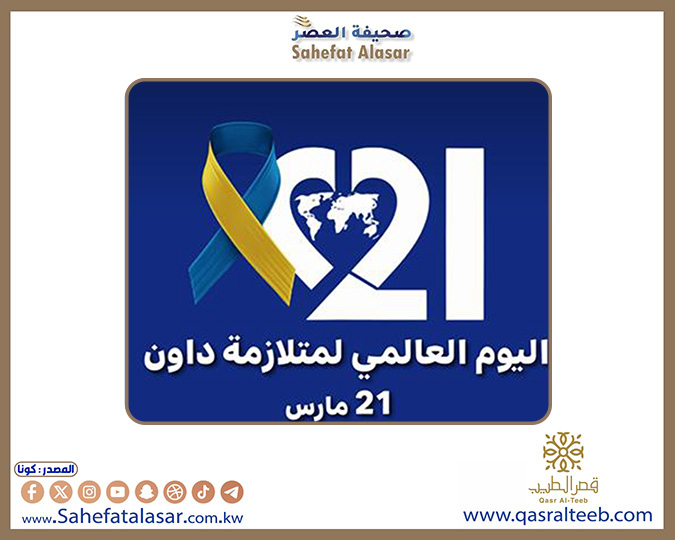


Kuwait joins the world this Friday in celebrating **World Down Syndrome Day**, which aims to raise awareness about the syndrome, its causes, and to support individuals with Down syndrome by encouraging them to study, work, and achieve, enabling them to become active members of society.
**Down syndrome** is a genetic disorder caused by an abnormal division of cells in genetic material, resulting in an extra chromosome. It varies in severity from one child to another, causing intellectual disabilities, lifelong developmental delays, and learning difficulties in children.
Access to healthcare, early intervention programs, and regular follow-ups are essential for managing Down syndrome. The quality of life for individuals with Down syndrome can be improved by addressing their needs through medical support, guidance, family care, and community inclusion to empower them and help them achieve their potential.
In this regard, Dr. Laila Bastaki, Consultant and Head of the Kuwait Center for Genetic Diseases, told the Kuwait News Agency (KUNA) that the center provides comprehensive services for individuals with Down syndrome, starting with pre-implantation egg screening to ensure the birth of a healthy child.
Dr. Bastaki explained that these services include detecting fetal Down syndrome during pregnancy, early diagnosis after birth, and continuous, intensive follow-up for affected newborns from birth through childhood and into adulthood.
The follow-up aims to prevent and detect complications associated with Down syndrome, such as congenital heart defects, thyroid hormone deficiencies, celiac disease (gluten intolerance), obesity, type 1 diabetes, intellectual disabilities, hearing loss, and psychological, immune, and respiratory disorders.
Dr. Bastaki noted that Down syndrome occurs due to an abnormal number of chromosomes during cell division in the embryo immediately after fertilization. This results in a child being born with 47 chromosomes instead of the usual 46, due to an extra copy of chromosome 21.
Medical statistics show that the likelihood of having a child with Down syndrome increases with maternal age, particularly over 40. On average, the incidence of Down syndrome is 1 in 800 births. This ratio rises to 1 in 32 births for mothers over 45 and drops to 1 in 2,000 for mothers under 23.
Symptoms of Down syndrome include distinctive facial features, delayed mental and physical growth, and potential complications involving the heart, thyroid, and intestines.
Diagnosis after birth can be initially and tentatively confirmed based on the newborn's physical appearance and examination, but definitive diagnosis requires a chromosomal analysis through a blood sample.
During pregnancy, Down syndrome can be diagnosed through ultrasound imaging at the end of the first trimester to examine the fetal neck area. A maternal blood test can also be conducted in the 10th week of pregnancy to detect the fetal genetic profile, or through amniotic fluid sampling, which contains fetal cells for analysis.
Dr. Bastaki explained that there are three types of Down syndrome. The most common type (95% of cases) involves three copies of chromosome 21, resulting in 47 chromosomes. The second type (4% of cases) occurs when chromosome 21 attaches to another chromosome (13, 14, 15, 21, or 22). The third type, mosaic Down syndrome (1% of cases), involves a mix of cells with the normal number of chromosomes and cells with the extra chromosome 21.
She noted that providing healthcare services, particularly for heart and thyroid issues and other complications, along with increased public health awareness, has contributed to a rise in the average lifespan of individuals with Down syndrome from 25 years in the 1980s to over 60 years today.
For her part, Maryam Al-Kandari, Secretary of the Kuwait Down Syndrome Society, told KUNA that the society offers a variety of services for individuals with Down syndrome, including rehabilitation, training, educational programs, and life and vocational skills development.
The society also provides family support, counseling, and organizes lectures and courses on how to interact with children with Down syndrome, focusing on educational and social integration. It collaborates with schools and government entities to integrate individuals with Down syndrome and offers sports, artistic, and musical activities.
Al-Kandari emphasized the importance of sports activities for individuals with Down syndrome, as they improve cognitive abilities, increase attention spans, channel energy positively, and enhance physical capabilities. The society provides daily sports activities for them.
Through workshops and training programs, the society prepares individuals with Down syndrome for the job market, teaching them professional behavior skills, self-reliance, and vocational guidance tailored to their abilities and market needs.
The society works to raise awareness about the rights of individuals with Down syndrome, promote societal awareness, reduce discrimination, protect their human rights, and empower them to express themselves, ensuring their full inclusion in society.
Al-Kandari noted that around 400 individuals of various nationalities benefit from the society's services, with approximately 4,000 cases of Down syndrome in Kuwait. She emphasized that the society's mission is to provide comprehensive services for individuals with Down syndrome.
She highlighted the fruitful cooperation with the Ministry of Education to develop an integrated program, noting that partial integration is already in place in some ministry schools, with a general trend toward full inclusion for capable individuals.
Al-Kandari stressed the importance of achieving the goals of integrating children with Down syndrome into society and providing them with services in the same environmental conditions as their peers.
Regarding the use of artificial intelligence (AI) applications in training and preparing individuals with Down syndrome for the job market, Al-Kandari stated that this is a global trend. The society aspires to leverage AI to benefit its members and is already training them on some AI programs.
The society is working to enhance the education of individuals with Down syndrome in technology and its applications, and has conducted courses to train parents on teaching their children AI applications, particularly in speech therapy.